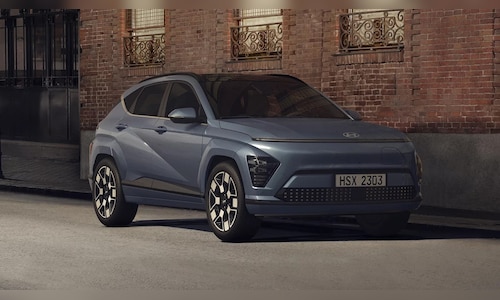The SUV rollout will begin with its first made-in-India electric vehicle early next year and the launch of at least two gasoline-powered models designed for the market from 2026, three sources with knowledge of the company’s plans said.
The strategy of adding higher-margin offerings, followed in conjunction with Hyundai’s first listing outside South Korea, signals its bullish outlook in the world’s third-largest auto market as its presence in China shrinks and sales at home decline.
Hyundai’s sales in India have been second only to those of Maruti Suzuki, although a rapidly changing competitive landscape has seen domestic giants Tata Motors and Mahindra & Mahindra eat into its market share with new SUVs that, rather than the small cars that were once the favourites, are the best-selling vehicles.
This has reduced Hyundai’s market share in India to 14.6% from 17.5% four years ago, while Tata’s share has almost tripled to 14% over the same period. The next biggest foreign rival, Toyota 7203.T, has seen its share rise to 6% from 4%.
“Hyundai is in a tough spot,” said VG Ramakrishnan, managing partner at consultancy Avanteum. “Their main focus should be on how to maintain their market share and the only way to do that is with faster product launches.”
Hyundai did not respond to requests for comment on its plans in India.
‘VIBRANT MARKET’
India is Hyundai’s third-biggest global revenue generator after the United States and South Korea, and it has already invested $5 billion in the country with commitments to inject another $4 billion over the next decade.
“We are proud to consistently secure the second-largest market share in this vibrant market and will continue to elevate Hyundai as a premium brand,” Hyundai Motor Group Chief Executive Euisun Chung said during a visit to India in April.
Hyundai’s introduction of India’s made-in-India electric SUV in 2025 will be followed by four more EVs by the end of the decade as it mulls plans to turn the country into a regional EV export hub, said the three sources, who were not authorised to speak to the media.
Hyundai will also launch hybrid cars in India amid a broader strategy to boost global sales by 30% by 2030, unveiled on Wednesday, contributing to its plan to sell higher-priced vehicles in the country to boost margins.
The share of its cars costing at least $18,000 (considered luxury in India) doubled to 15% between 2021 and 2023, according to draft IPO documents filed in June.
Hyundai, which plans to sell up to 17.5% of its stake in the Indian business to the public, said it would continue with this “premiumisation” strategy, which has helped it post some of the highest profit margins among its peers in India but has come at the cost of losing volumes.
The carmaker will need to maintain a delicate balance between market share and margins after its listing, Ramakrishnan said.
“If there is a fall in either, the company may be questioned by shareholders,” he said.
Hyundai’s market share decline comes despite achieving its highest ever sales in India last fiscal year.
INTENSE COMPETITION
Hyundai came to India in 1996 and its initial success in the country, which has been a graveyard for automakers like Ford and General Motors, was due to affordable hatchbacks like the Santro, which has since been discontinued.
As customer preferences changed, Hyundai launched its first locally made SUV in 2015. The mid-size Creta, priced between $13,000 and $24,000, was an instant hit and is Hyundai’s biggest cash cow.
Hyundai now has eight SUVs in its 13-car portfolio, but its share in India’s total SUV sales of 2.5 million units last fiscal year fell to 19% from 24% three years ago, the IPO documents showed.
Of the two new petrol-powered SUVs Hyundai is planning for India, the first will be based on its Bayon crossover currently sold in global markets, the three sources said, competing against Maruti’s Fronx crossover and Tata’s Nexon SUV.
The latter will be larger than Hyundai’s Creta SUV and is expected to compete with Mahindra’s XUV700.
The two SUVs are expected to add around 120,000 units a year to Hyundai’s volumes, one of the sources said. The carmaker sold 615,000 cars in India, of which 63% were SUVs and the rest hatchbacks and sedans, and exported 163,000 vehicles last fiscal year, industry data showed.
However, Hyundai’s rivals are not sitting idly by.
Tata, India’s best-selling electric vehicle maker with a market share of more than 75%, has said it plans to launch five electric vehicles in the next three to four years, taking its total to 10.
Mahindra has said it will launch seven electric SUVs and six new petrol SUVs by the end of the decade. Market leader Maruti is doubling down on SUVs and hybrids, and plans to launch six EVs by 2031.
“What has brought Hyundai this far may not necessarily bring it into the future. Competition is more intense,” said one Indian Hyundai supplier.
Disclaimer:
The information contained in this post is for general information purposes only. We make no representations or warranties of any kind, express or implied, about the completeness, accuracy, reliability, suitability or availability with respect to the website or the information, products, services, or related graphics contained on the post for any purpose.
We respect the intellectual property rights of content creators. If you are the owner of any material featured on our website and have concerns about its use, please contact us. We are committed to addressing any copyright issues promptly and will remove any material within 2 days of receiving a request from the rightful owner.

